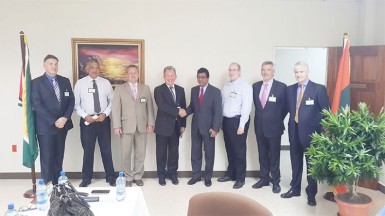Agencies responsible for the investigation of money laundering activities are undergoing training in recovering assets from persons involved in serious crime.
The Financial Investiga-tion Training Course commenced yesterday at the Bank of Guyana with participation from the Financial Intelligence Unit (FIU), the Special Organised Crime Unit, the Guyana Police Force and Central Bank.
Speaking at the opening, UK High Commis-sioner Andrew Ayre said asset recovery is critical because the public needs to be reassured that crime does not pay and that criminals do not get to keep the fruits of their illicit activity.
“Asset recovery disrupts the criminal economy. Criminals find their working capital disappearing, their fellow crooks lose confidence in them and they have to dream up new ways of hiding loot from investigators,” he said.
“Criminals used to think of prison as an occupational hazard—when caught for the crime, do the time—but secure in the knowledge that when they emerged through the prison gates, they could carry on where they left off and return to their comfortable lifestyles. Our experience indicated asset confiscation is a greater deterrent,” he added.

He noted that the training would enable agencies to better detect criminal activities and other persons involved in the crime that may not have been suspected earlier. “Seizing cash at the border has led to the identification of individuals engaged in crime.
It also enables these individuals to be prosecuted for money laundering, which should be treated as a serious offence,” he said.
Ayre also noted that that proceeds recovered can be used to supplement the resources used by elements of the criminal justice system to effectively fight money-laundering, which he called a “delicious irony.”
He told Stabroek News that the recently signed Memorandums of Understanding and the work done by the government within the last nine months have showcased a keen attention to moving forward on anti-laundering legislation and training. Ayre did state that the training was based on the 2009 Anti-Money Laun-dering and Countering the Financing of Terrorism (AML/CFT) law, while the current prorogation of Parliament will greatly affect the passage of the amendment bill.
He stated that the 2009 legalisation was solid, however, the amendments are necessary to bring to light the various changes over the last five years. He said that with or without Parliament, the work had to continue.
When asked by the Stabroek News if the UK was pleased with the amount of time the government has taken to establish the non-legislative components of the Financial Actions Task Force’s requirements, he said the future was more important than the past.
Attorney General Anil Nandlall said regulations needed to be put in place for various areas with commercial interests that currently do not fall into any particular legal category.
He highlighted real estate agencies and used car sales as two areas that were currently being examined. He noted that there have been some difficulties, because of the non-statutory nature of these types of entities, in putting mechanisms in place that would require the mandatory exchange of information with the institutions that investigate money-laundering.
Nandlall said that it was imperative to bring in realtors, and used cars sellers and other such businesses to study trends that could then be passed on and the flow of money could be patterned and used in training of police and members of the Special Organised Crime Unit (SOCU) and the FIU.
The two week course is funded by the US Embassy and presented by the British government and the UK-funded Caribbean Criminal Assets Recovery Programme (CCARP) and facilitated by three trainers from AML Global Consulting (AMLGC).
Ayre said that afterward the UK would provide practical advice and guidance and “live case” mentoring. He added that it would also help local magistrates and judges to acquire the necessary knowledge and skills to properly adjudicate such matters when they come before them.





